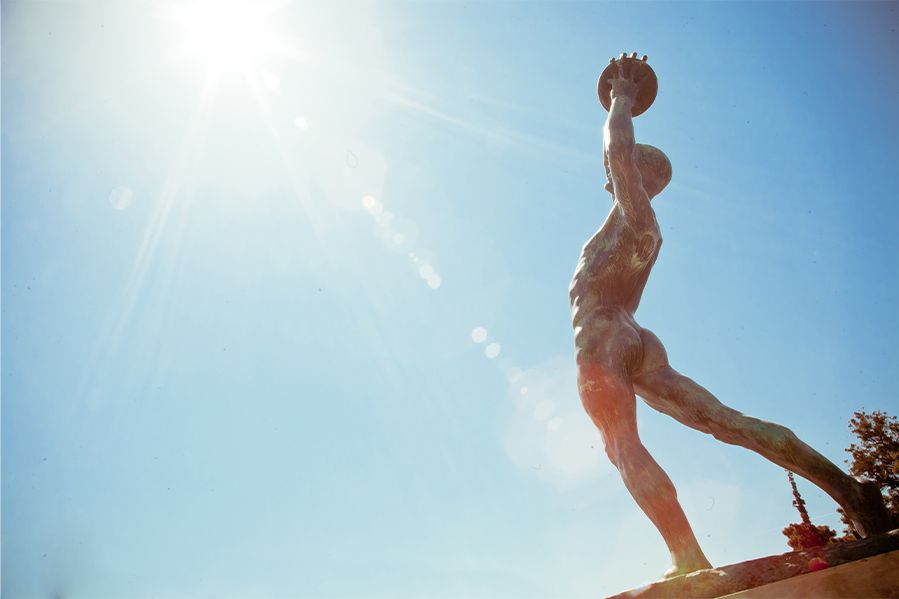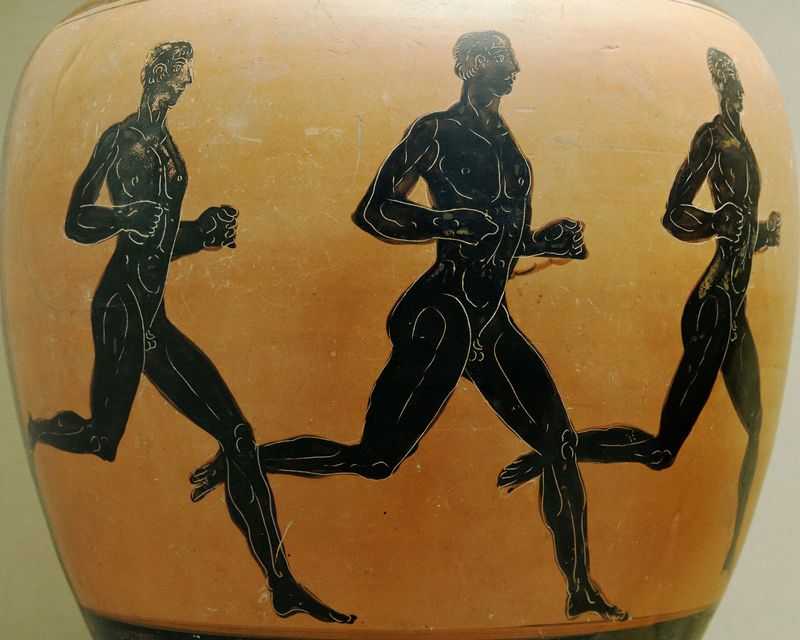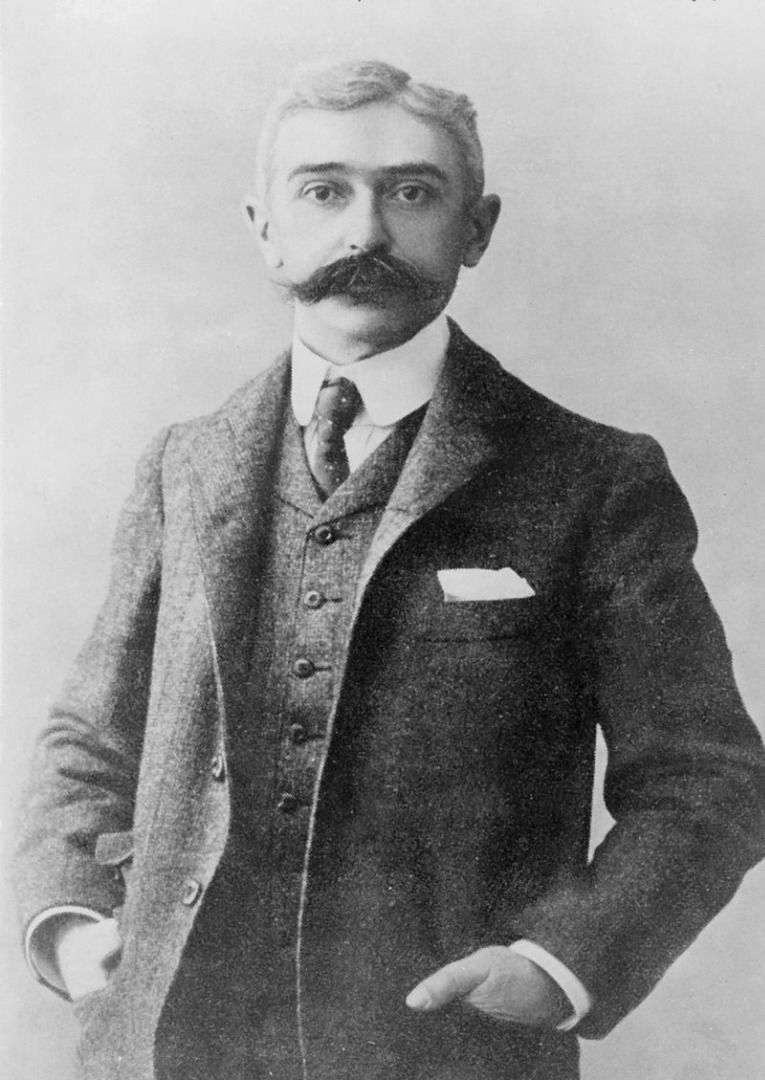
The 2024 Olympic Games are upon us! But how much do you know about the Olympics, really?
You probably know that the Olympics derive from Ancient Greece, and that the modern games look a lot different from their millennia-old counterparts.
The modern Olympic Games are a global spectacle, featuring the world’s greatest athletes fighting for personal and national glory before the eyes of millions watching around the world.
Related: Did the Olympics Opening Ceremony Mock Christianity?
But did you know that the original games were actually one big religious ceremony, with each astounding athletic feat a tribute in and of itself to Zeus and other Greek gods?
This is the secret religious history of the Olympic Games.
An Ancient Ceremony for the Gods

The Olympic Games were held in the ancient Greek city of Olympia from the 8th century BCE to the 4th century AD. Local city-states would send their greatest athletes to compete in a series of athletic games all in honor of Zeus, the king of the gods who resided in Mount Olympus.
Now, you might be picturing an event where homage is paid to the gods to begin the festivities – similar to how we sing the national anthem before baseball games today.
But to the ancient Greeks, everything about the games were meant to honor Zeus and the other gods: from the camaraderie, to the athleticism, to the location of the games themselves in a holy sanctuary all Greeks were welcome to worship at, regardless of their home city-state.
Winners of the games were crowned with olive tree wreaths that were cut directly from the sacred olive tree of Zeus (which also doubled as the finish line for races).
To watch the games, let alone compete in them, was a deeply spiritual experience.
“At its heart, the Ancient Olympic Games was a religious festival held in a religious sanctuary,” explains Paul Christesen, professor of Ancient Greek History at Dartmouth College.
What Happened to the Ancient Olympics?
For much of the original Olympic Games’ run, they were an immensely popular fixture of Greek life and culture.
Though it’s unclear why the games stopped in the late 4th century, historians believe a variety of factors contributed, including flood and earthquake damage to Olympia’s interior, as well as invasions from barbarians.
The last confirmed Games in the archeological record were held under Theodosius I in 393, and some historians believe that he banned the games after, banishing what he believed to be a pagan ritual as the Roman Empire shifted away from the ancient faiths and towards Christianity and Theodosius I himself sought to purge any and all pagan influence from Greco-Roman culture and life.
The Modern Games Are Born

We don’t often associate faith with the modern Olympic Games, but even those have their roots in religion.
In 1894, Baron Pierre de Coubertin founded the International Olympic Committee, and two years later, in 1896, the first modern version of the Olympic Games was held in Athens. Coubertin, a French intellectual born of an aristocratic family, was inspired by his own strict Jesuit upbringing when initially seeking to revive the Olympic Games, believing that a global test of strength and skill would build unity and peace in a distraught world.
Coubertin also found inspiration in one of his heroes: Thomas Arnold, a deacon who taught of “muscular Christianity,” or the sentiment that strong faith and strong bodies creates strong men. Coubertin thought that the bodies of Olympians "would embody a personal kind of sacred temple ... he would be his own representation of the sacred body of followers," according to Olympic scholar Anthony Moretti. Armed with faith in God and man, Coubertin was successful in reviving the Olympic Games.
Olympics Religious Elements
What originated in the ancient world as a sacred athletic tribute to mythological gods was revived centuries later by individuals guided by a different type of faith, but who nonetheless saw overlap in athletic competition and spirituality, believing that a global spirit of competition could bring together the world.
Indeed, one can see elements of religious ritual in these modern traditions, including the carrying and lighting of a sacred flame, the raising of a flag, and the singing of an anthem in the opening ceremony – which was originally called the Olympic Hymn.
Now the world turns its eyes to Paris, where over a billion people around the globe are expected to watch the 2024 Olympic Games.
How many of those viewers will know that they're witnessing the modern version of an ancient religious festival?
8 comments
-
No problem either way. A majority of modern celebrations, observances, and rituals have an ancient religious beginning. What is important is how we celebrate today. And remember, to some people sports are a religion. Enjoy the games!
-
Christianity is not a monotheistic religion. It has three major deities and countless lesser deities (called saints) the first of the 10 commandments (paraphrased) is : I am the lord your god. You shall have no other gods before me. To me, this means that there are many gods and this one wants to be first among equals.
-
They appeared to have left off the part of the wild orgies they had, and from what I hear are still a part of the background of the Olympics today as well. I also think of this bible verse which most of Christianity disagrees with. Gal 5:20 Idolatry, witchcraft, hatred, variance, emulations, wrath, strife, seditions, heresies, if you look up the word emulations in the Noah Webster 1828 dictionary, it gives this "Contest; contention; strife; competition; rivalry accompanied with a desire of depressing another." Which would eliminate all the competition.
-
This would explain why the Olympics took an antichrist approach to the demonic displays of so called art. It's refreshing to see God fulfill his promise so quickly after the transvestite rendition of last supper. God will not be mocked, they mocked God, the city went dark but not a church on a hill. Amazingly it was the only illuminated building. Literally directly from the book of Mathew.
What a wonderful lord we have to issue a gentle and biblically accurate warning like this. Unfortunately when the warnings go unheeded warnings become absolute judgement.
God Rocks!!
-
Not sure what power outage you are talking about, or if that is just your version of talking about sharks and electrically powered boats, but it has the makings of an evangelical rant.
-


The ancient Greeks had a fascinating culture. While today many think of the Greeks gods and goddesses as myths, we might be premature in that assessment. Even the Roman Catholic Church developed rituals to pray to Mary the mother of Christ, the apostles, and the saints. This belief in spiritual sources who can help us navigate our life here on earth seems to be an enduring one. The church might not call them gods and goddesses, but it serves much the same purpose. I have a book about Greek life which I'm about halfway through and their spiritual beliefs are worth reading.
All coming about from ignorance of the greater world. Thunder, lightening, (very very frightening) was thought to be from thor. god of the sea, mountain top gods, godlings and demons, all naive ways for ignorant people to explain natural facts.
It has never been anything more than a human's way of explaining the natural world around them. How else to explain earthquakes, hurricanes, drought, floods, pestilence, volcanoes other than that somehow the gods had been angered.
I hope in my lifetime we will finally see the end of silly, superstitious religion that only harms people, especially children. Even more so because the only people to benefit (PROFIT) from religion are adults who connive, steal and twist the minds of the ignorant followers and believers in order to profit from it and them
‘ I hope in my lifetime we will finally see the end of silly, superstitious religion…’
Not going to happen. But religious belief is on a decline. The internet makes ‘real information’ readily available, along with opportunity to have discussions with non-believers. But there are large groups of religious fanatics, some of which are willing to die for the opportunity to fly planes into large buildings for their beliefs. That’s not going to completely disappear in a couple of generations.
But it will die out.